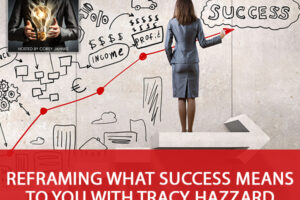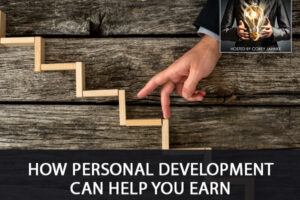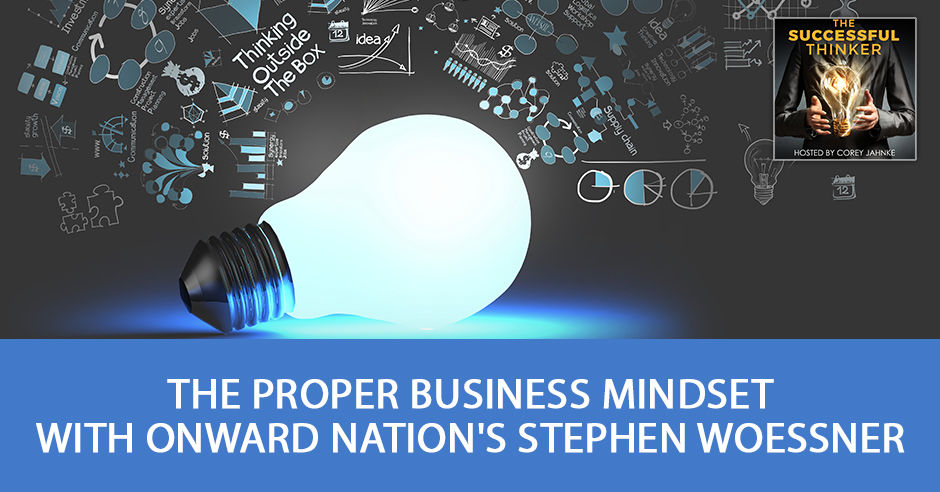
Establishing the proper business mindset is a crucial first step that leads to your success. Stephen Woessner, the host of Onward Nation and CEO of Predictive ROI, shares the evolution of his business from being stuck to killing it by stepping out of his comfort zone and taking on an entirely new endeavor that blossomed into opportunities he didn’t even know existed. He also points out the essence of mentorship to be able to see things clearly. Discover how you can develop this mindset as Stephen talks more about beating fear and imposter syndrome and why becoming a lifelong learner is critical to your success.
—
Listen to the podcast here:
The Proper Business Mindset with Onward Nation’s Stephen Woessner
How To Go As Far As You Can See So That You Can Learn To See Farther
There are things that you never understand in your life until you’re actually right smack in the middle of them. One of the great things is that when you’re a podcast host, you meet lots of cool people. I happen to be lucky enough to meet this gentleman when I was on his podcast many moons ago and it was one of the best times I ever had. I’m excited because this fellow’s on and he’s going to teach us a lot of things, but one of the most important things that he’s going to teach us is how you set your mindset to run a good business. This fellow is not just someone that I’m excited to interview. He’s someone I’m excited to call my friend. His name is Stephen Woessner.
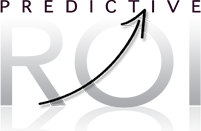 He’s the Founder and CEO of Predictive ROI, a digital marketing agency and the host of Onward Nation, which is a phenomenal podcast. It’s top rated, it’s daily and it teaches you how today’s top business owners think, act and achieve. Onward Nation has listened to in 113 countries around the world and Stephen has written three books, including the number one bestseller book, Profitable Podcasting and his digital marketing insights have featured in Forbes.com, Entrepreneur.com, The Washington Post and Inc. Magazine. Stephen, I’m excited. How are you doing?
He’s the Founder and CEO of Predictive ROI, a digital marketing agency and the host of Onward Nation, which is a phenomenal podcast. It’s top rated, it’s daily and it teaches you how today’s top business owners think, act and achieve. Onward Nation has listened to in 113 countries around the world and Stephen has written three books, including the number one bestseller book, Profitable Podcasting and his digital marketing insights have featured in Forbes.com, Entrepreneur.com, The Washington Post and Inc. Magazine. Stephen, I’m excited. How are you doing?
I’m excited too and thank you very much for the invitation, Corey. It’s a pleasure. Thanks for being my guest on Episode 36 and then again for our encore in Episode 519 of Onward Nation. You crushed it both times. It’s a joy to be here with you.
I was reading the book about podcasting. One of the things that you did is you shared your story about how you’re sitting at the porch, you’re looking out at your daughter and things aren’t going so well for you. Could you please tell the Successful Thinkers out there your story and how you got moving in the right direction?
Everyone has experienced imposter syndrome, even Jesus Christ, Martin Luther King, and Abraham Lincoln. Share on XThat was May 15th of 2015 and thankfully it feels like a million years ago but yet not really. You’re right. Things were not going well. My business partner and I came back from being onsite with one of our clients and subsequently lost that business. It was a major client of ours. We were in middle of May. We had not enough revenue on the books and way too many costs. We’re overstaffed. I did not know what to do. As I’m watching the sunny day and my daughter’s playing with her friends in the neighborhood, that all sounded awesome and looked awesome but on the inside, I was being torn up. I thought, “We’ve got to do something different. We’ve got to do something radically different. Otherwise, I’m not sure what business we’re going to have.”
It was so ironic because Predictive ROI, we’re a digital marketing agency. We pride ourselves on being able to drive leads and revenue for our clients and yet we weren’t doing it for ourselves. I fired off an email to my team and said, “30 days from now, June 15th, 2015, we’re going to launch a daily show. I’m going to interview the best business owners I can find and we’re going to take their stories, we’re going to share that with the world and that’s going to drive revenue for us.” Obviously, that is not much of a strategy but that was the strategy at that point, which is not much. Thankfully, after we launched the show, a couple months later, we had a couple of guests come to us and say, “Could you do that for me?” I’m like, “Do what for you?” They’re like, “Could you build us a podcast?” All of a sudden, our entire world changed. May of 2015 was not an awesome place to be.
It’s so terrible to be looking out at your family thinking, “How do I support these people? How do I fund their dreams when right now I can’t even support myself and fund my own?” I’m proud of you for stepping up and taking that first step forward. One thing that I know about you that the audience doesn’t yet know is you knew how much about podcasting when you made that decision.
Zero. In fact, it probably would be fair to say less than zero, if that’s a possible number. I’d been a guest a couple of times. I owned a headset and I was a guest on EOFire with John Lee Dumas and in a couple of other shows. I knew how to plug in my headset and literally that was it. I knew nothing and our team knew nothing as far as the mechanics of it, how to produce them, how to record them, what do you do with the content once you have it? We knew zero. We went from zero to knowing what we were doing in about 30 days. That was years ago and we’ve certainly gotten much better since. We started with zero. It was literally because of sheer desperation and hopefully this works. Thankfully it did and led to success, but not without a lot of long nights.

Business Mindset: A good mentor will step in and sometimes hit you with that bucket of ice water to wake you up.
I’m a collector of quotes and one of my favorites is JP Morgan’s quote where he says, “Go as far as you can see because when you get there, you’ll be able to see further.” It’s important that people realize that standing still isn’t going to fix your anxiety. When you got into the process of starting to build your podcast, how did you go about getting through the fear? Fear is probably the worst business ally you can have.
I’m not sure which of my mentors suggested this, but I’m sure somebody did because I don’t know that I would have thought of this on my own. After I sent off that email to our team, I sat down at my desk with my journal and I made a list of everybody who I could possibly think of that I could ask to be the initial round of guests. Somehow, I knew that if I did a good job in those first few interviews, that more people would say yes. I wanted to make sure that the initial batch of interviews were also people who if I did a decent job and they knew me enough, they have context of relationship, that they would also help me promote the episodes. They would share it on LinkedIn, Facebook, Twitter and that stuff or whatever.
I sat down and I made a list and then I reached out to them hat in hand and said, “I’m starting this thing. I’d be honored if you were my guest on episode one.” Scott McCain, if you’re reading, thank you very much my friend. Praise God, Scott said, “Sure, I’d do that for you.” I’m like, “If he said yes, how about Don Yeager? If he said yes, how about Darren Hardy?” Then it started this flywheel of momentum. I sat down and made a list of people who I knew and then thought, if this person says yes, then maybe I could go to this next person who knows this first person and say, “I just did an interview with Scott, I would love to interview you too.” It grew from there. It starts with that initial list and having the courage to hit send.
I love that because Seth Godin talks about shipping. What he says is that sometimes the hardest thing you could do is to hit publish, send or go. Sometimes that’s the only thing you can do. One of the things that I was excited about when I read your book, Profitable Podcasting, is your transparency. It’s one of the neatest things about you. You had said to me when we were talking at that time, it was only Episode 36, you and I were getting to know each other and you were telling me about a story about Darren Hardy. Here you were in a position, where you could have tried to sound like this big hot shot podcast host, instead you said to me something and I’ll never forget it. Do you remember this story when you were telling Darren Hardy that you sucked at something?
We must discipline ourselves to act in spite of our fears. Share on XVividly, yes.
Can you share that with the Successful Thinkers? I know it’s not fair of me to do that, but I think it’s great.
For some additional context for your audience. Many moons ago, Darren was on our board of advisors for a period of about twelve months. I spent a lot of time with him, whether that was in person or in accountability calls and so forth. In one particular phone call that he and I were having, I was lamenting to him about how big I wanted Predictive ROI to become and I was struggling with it because at the time, I never considered myself a good manager or a good leader of people. I said, “Darren, I’m not sure how I’m going to build Predictive because quite frankly, I suck at it as far as managing people.” I stopped and I’m waiting for the pearls of wisdom and he goes, “Stephen, you need to stop sucking at it.”
I’m like, “What?” He goes, “Don’t give me that excuse. Don’t give me that limiting belief that you’re not any good at it. Stop sucking at it. Be better at it.” I’m totally stripped out. I’m like standing there naked. I’m like, “I can’t believe that he just said that to me.” Twenty seconds later, once it’s set in I’m like, “He’s right. I do need to stop sucking at it.” That’s what a good mentor does. A good mentor will step in and sometimes hit you with that bucket of ice water to wake you up and say, “No, you need to stop sucking at it. It’s not that you’re not capable. Stop telling yourself that lie, that limiting belief, get better at it and stop using that as an excuse.” I had a great deal of respect for him in that moment because that’s what a good mentor does.

Business Mindset: Where business owners often make a mistake is thinking they need to cast a wide net and then they serve no one when that happens.
I think that your podcast was actually the first ever podcast that I was a guest on. When you told me that story, it was so funny because now all of a sudden, I’m at ease. You and I are laughing and joking. I thought the episode came out well. One of the things that was also interesting, since we’re on the subject of Mr. Hardy, in your book, you did something interesting. You told us a story about when Darren was giving you advice. You said, “Because of my arrogance and because of my pride, I didn’t take his advice.” You remember that part?
I remember it happening too.
That’s so interesting because what your book said to me is it’s not so much about the strategy of how to launch a podcast, because that part is the part that you can do for me. It’s the part about the mindset. Can you walk me through how you lay that out in your mind to your clients, so that when you get a new client and you’re going to put together a podcast for them, how you walk them through the mindset that they need to have, if they’re going to make this successful?
We do that through, as you might imagine, a number of different steps. Six to be exact. They each build on one another. We do that whether that’s across meetings, checklists or whatever. The biggest hurdle that somebody has to deal with, and you mentioned fear, it really is that. It rears its ugly head in the form of the imposter syndrome. It’s the, “I know I said yes that I want to have a podcast to support my Biz Dev, within my company.” I’ve had a little bit more time to think about it, you’re starting to ask me for things and you’re starting to ask me to think about things, what guests would what I want to interview or what questions that I might ask or what’s my point of view?
There is an abundance of free resources available to all of us that eliminate the excuses of not investing in yourself. Share on XI don’t know. What if I don’t have a unique point of view? What if we don’t have a value ladder? Actually, I don’t know why clients hire us. All of these really bad questions start popping up in people’s minds and it’s the imposter syndrome. Part of our process revolves around helping clients in baby steps. Break these things down, “Let’s deal with value ladder and let’s figure that out. This is how a client hires you. This is what the customer journey looks like. These are the typical transactions. Awesome. Now we’ve got that. Let’s set it aside. Great. What’s point of view? Let’s break that down. Why do you do what you do? Why don’t you do something else? Who are the people that you look to serve? Who are the people that you don’t want to serve? What’s the fundamental reason as to why it is that you feel so passionate about doing that?”
We have a deep conversation around that and all of a sudden, their point of view becomes clear. It’s like, “We’re going to work that into episodes. We’re going to work that into questions. Let’s now talk about your dream 25.” If you could build a list of the 25 clients that you most wanted to serve, who would those people be and why? We build out the list. Part of it is being able to take it, this big scary thing and break it into small chunks, over six-step piece, then it becomes less scary. If we went into it right away, it’s going to feel scary. We’re not going to make any progress. Somebody is going to come up with fifteen to seventeen different excuses as to why they can’t get it done. If we don’t combat that, it will rear its ugly head and then the show will never launch.
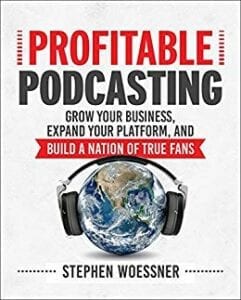
Profitable Podcasting: Grow Your Business, Expand Your Platform, and Build a Nation of True Fans
I love the way you laid that out. Essentially, imposter syndrome is something that pretty much is everybody.
Every single person who has ever walked the face of the Earth has dealt with the imposter syndrome. I was standing in front of a group at a speaking engagement. We were having this deep conversation around imposter syndrome. I am a man of faith and it’s not like I have a message of faith for your readers. I don’t have a conversation for them whatsoever around that, but I’ll use this as an example. I’m standing in front of this group and I said, “Every single person that has walked the face of the earth has dealt with imposter syndrome, even Christ.” People looked at me and are like, “What?” I’m like, “Even Jesus Christ, you go back to the gospels and you go to the moment in time right before he’s arrested in the Garden of Gethsemane. His prayer is he doesn’t feel that he is worthy to carry this cup. He doesn’t feel like he is worthy of this mission that the Father has bestowed upon him.” If there’s somebody else or some other way or some other form that this could happen without him, then that would be awesome, to paraphrase. Ultimately obviously, it was him and because he did have what it took and he was the person to get it done, because obviously he’s the son of God. My point is that every single person who has walked the face of the Earth has dealt with feeling that they were unworthy of the reason that they are here. It’s not unnatural is my point.
I remember hearing a similar story about Martin Luther King. It wasn’t like he walked into the world saying, “I’m ready to deliver this incredible message and be the person who is the standout speaker for this cause.” It evolved over time.
Look at Abraham Lincoln in abysmal failure. Most people have dissected that up one side and down the other. In his early years of running for office, the Gettysburg Address was in him but it took years of trial, tribulation, failure, beat down, ridicule publicly in order for him to step into the greatness that was then the Gettysburg Address. It took years of being beat down, humiliated for him to stand up, stretch his shoulders back and be the president of bravery and courage that we needed. Ultimately who gave the ultimate sacrifice for what he believed in. Everybody has dealt with the imposter syndrome.
One of the things that I thought was impressive about the stories that I’ve heard about Abraham Lincoln is his ability to seek out advice even from people who opposed him. One of the things that you talk about in your book, on page 20, you talk about finding a mentor. Can you share with our audience your view on mentorship and how critical it is to success?
Do not put your head in the sand and hope the problems would go away. Share on XIt’s one of the foundational ingredients to success, to not put too fine a point on it. It’s that important. Oftentimes, we’re struck by fear or are paralyzed by fear, whether that’s the imposter syndrome or some other term that you want to put on it. We have our own arrogance that we’re making poor decisions based on that. We don’t have the right connections. Our business model is flawed. All of these things are gaps, blind spots or whatever term you want to put on it, that we as business owners can’t see. Where a mentor who has done what it is that we’re looking to do, can step in and he or she can shorten our learning curve, can open our eyes, can make connections and introductions, can help us launch new product, can finance the business maybe, can give us the wakeup call, the thump on the shoulder, the whatever, in order for us to be able to see things clearly.
Mentorship, in my opinion, is so critically important. The best of the business, whether we’re talking about business, we’re talking about sports or we’re talking about whatever other areas in life, that person has probably had a mentor, three, four, a coach or whatever, who has stepped in and helped that person accomplish what they’ve accomplished. Tiger Woods won his fifth green jacket in his 15th major championship. As he’s walking off the 18th green, one of the greatest stories in sports was played out. In sports history, played out on the 18th green and off the green at Augusta. He’s walking off, after he hugs his son, his daughter, his mom, his girlfriend and so forth, what happens after that? He hugs a coach. He hugs other golfers, other winners. He hugs and shakes hands with so many people who are there to congratulate him, who were part of that journey in some way, in a big way or a small way. My point is that every single person, even Tiger Woods, has a support system. Why on Earth, if you’re a business owner, would you not follow that same path?
It’s an interesting thing, when you think about the way a business comes about. For instance, I want to share how The Successful Thinker podcast came out. I had written this book and it was out there. I was looking at all these things that I wanted to do in terms of speaking. People told me because I was a pharmacist, that I should do healthcare and things. A good mentor called me up and she said, “What is the matter with you?” I said, “What?” She said, “I read your book. What is the matter with you?” I said, “What are you talking about?” She said, “Why are you not out there screaming this thing from the rafters?” It totally changed my business around. Have you had stories like that, that have come back to you through Onward Nation?
Yes, although slightly different because I can’t think of a time that somebody has necessarily said, “Something that you said changed my life.” We have certainly heard that, with respect to what a guest is shared and that stuff because it’s been impactful. When we get reviews, we get emails, which we get a bunch of them thankfully, and please keep them coming in if you happen to be an audience of ours. We love that feedback because absolutely, when you hear that what you were doing and how you’re trying to support a community actually mattered, it gives you so much energy. It makes you want to run through a brick wall. It’s awesome.
The reason I asked that question in that way was that because I think that’s part of how you get through the fear. That’s part of how you get through the imposter syndrome. You talk about it in your book about your avatar. In fact, I’m working hard on the wonderful exercises that you put in there. When you get clear on that person that you’re serving, then all of a sudden you realize that if I don’t do this, I’m stealing from that person. You talked about your avatars being Harry and Sally. Can you tell our audience how you use your avatars to create your program?
Harry and Sally because I liked that movie, When Harry met Sally, it is one of my favorites. That’s the science behind those names. We’ll take it down to a granular level. When somebody reaches out and says, “I would love to be a guest on Onward Nation.” First of all, we’re always grateful to be on a list or in some network or something where we’re getting those types of invitations on a consistent basis. That’s awesome that the show has built some cool reputation. When we received that, myself and another member of our team have to think, “Does that person serve Sally? Does that person bring a point of view, bring an expertise, bring us something that Sally will find helpful, that Sally will find valuable?”
“Is Corey going to bring a nugget or two to the conversation that’s going to be unique, different, insightful, strategic, tactical, practical, whatever, that Sally’s going to listen to that conversation and say, “I am so glad that Stephen sat down for a conversation with Corey because that is really helpful. I’m going to take that and that. I’m going to go put it in my business and be better for it.” If that litmus test fails, then we don’t book the guest. If it’s a yes, then we enthusiastically book the guest and we can’t wait to have a conversation with that person. From an audience perspective, we are always running that through our filter. On the business side, Predictive ROI, it’s then we think, can we be helpful to Sally? Can we be helpful to move Sally’s business forward? If we were to help her create content, lead gen off that content and then sales funnels off that lead gen, can we be helpful in moving Sally’s business forward?
Does she work in an industry where we have expertise? Does she work within a niche, within an industry that we have expertise? Do we know some of the same people that we can make cool introductions on behalf of Sally and she’ll think that’s awesome? If the answer’s yes to all of that, awesome, then we have that conversation with Sally. If the answer is no, then Sally is not the right fit for us and we don’t waste Sally’s time or hours. We move on to somebody else and try to find the true Sally. Part of it is having the discipline that it’s okay to say no to certain things, that we operate from an abundance mentality. I would encourage all of your Successful Thinkers to do the exact same thing. There is an abundance of opportunity. Where business owners often make a mistake is thinking they need to cast a wide net and then they serve no one when that happens.
That was probably the biggest takeaway that I got from your Profitable Podcasting book and I never thought of this. Cut it down to 25 to 50 people that you can serve rather than try to put a net around the whole world. I thought that was amazing. Certainly along the way, there have been issues, problems, roadblocks, obstacles that have come up in your journey from 2015. Has there not?
Every single person who has walked the face of the earth has dealt with feeling that they were unworthy of the reason that they are here. Share on XIt would be lovely if we were all skipping along the yellow brick road. It does not work that way. There are challenges every single day whether it is cashflow, whether it’s, “We need to hire three new people.” We need to hire new people because we’ve got a team of eighteen, but we’ve got to take it to 21. There are always issues. That’s business.
What strategies, techniques do you use to overcome those roadblocks when you run into them?
The first thing that we do within Predictive is talk about it. We follow the Entrepreneur Operating System or EOS. It’s based on the book, Traction, by Gino Wickman. Every Wednesday at 10:00 Central, myself, Erik Jensen, he and I own Predictive ROI together. One of our mutual leaders, Katherine Baessler, who’s our director of content marketing here at Predictive. The three of us make up the leadership team here at Predictive. Every Wednesday at 10:00 Central, for 90 minutes, we have what’s called an L10 or a Level 10 meeting. We’re going through all of the issues and those could be good or bad things, things we need to talk about. It’s very strategic and tactical meeting.
Every week, we’re going through the big things. We schedule as needed meetings. I also have a 90-minute partner meeting every Tuesday morning at 7:30 Central where Erik and I go through this as the state of the business. We review cashflow, constraints, problems, things we need to solve. At least three hours a week, we’re dealing with things proactively. Every single day, we’re meeting as a team at 9:00 Central for fifteen minutes to 45 minutes on Mondays and Thursdays. On Tuesday, Wednesday and Friday, it’s fifteen minutes.
We’re having check-ins with our team and our team is spread across the country. We’re bringing everybody together on Zoom in order to meet and deal with issues. We’re chatting and having meetings throughout the day, when we need to get over certain obstacles. We meet in person two times a year. All of it is wrapped up into how do we solve problems fast? How can we be proactive? My team knows this. That’s my favorite word in the English language, is proactive. How can we run toward problems instead of away from them? It’s been good for us.
The way you’re talking about is two things. One is that you should always have a system and know your numbers, which is a big part of your book. The other thing is the business of not putting your head in the sand and hoping the problems would go away.
That never works.
A lot of people are not successful thinkers because they think that wishing is a strategy. I appreciate you sharing that with me. You mentioned a book that you read and I know that one of the ways you get a lot of cool information is through your podcast. How else do you go about lifelong learning?
People have asked me, “You’re almost at 900 episodes. When are you going to stop?” I’m like, “Never.” “Why? Aren’t you going to ever get tired of it?” I’m like, “No, because on Tuesdays I could hang out with super smart people.” It’s like going to school. It’s like going to college every Tuesday. I get to hang out with really smart people and at the end of the day after interviewing five, six, seven people, I’m like, “What the world was that? That was awesome.” Hanging out with smart people. In addition to interviewing and having the privilege of interviewing super smart people that I get to learn from, I read a lot, whether that’s in Audible form, whether that’s a Kindle form, whether that’s in hardcover form, whatever, I read a lot.
I also attend mastermind groups. I also attend a bunch of events, probably between eight to ten in-person events of the year. I also like to travel to hang out with clients. I’m learning there too. Hopefully, sharing some things with value as well. I love being able to hang out with clients where I’m like, “I can’t believe you’re doing that in your business. That is awesome. I’m totally stealing that from you.” I say that out loud and they laugh too. Whether we’re talking about interviews, whether we’re talking about reading, listening, going to events, mastermind groups or spending time with clients in the trenches, all of that makes up my education program.
I think that’s so wonderful because people always tell me, “I can’t afford to put money into my self-education because I’m too busy paying my bills.” What do you say to those people?
My grandfather came here in the US in 1920 from Istanbul, Turkey. He couldn’t speak the language. He had $10 in his pocket. Six years later, he had enough. He had saved enough money to own his own restaurant in downtown Canton, Ohio and had a very successful 42-year restaurant career owning restaurants, owning three of them in fact, with a third-grade education. I don’t have the time, the space, the patience, the capacity for somebody who says, “I don’t have the money to invest in my education, I don’t have the time to invest.” Go to your library. Anybody can go to their public library and get an Ivy League quality education for free because of online courses put on by Stanford professors, Harvard professors funded through the Gates Foundation, funded through the Khan Academy.
There is Ivy League education available to anybody for free. Whether you have the money for a $25,000 mastermind or not is not the point. There are ample education resources that I think that my grandfather, who left us in 1986 that had he had the resources available to him, he’d had been a very happy man because he was a lifelong student even though he had a third-grade education. My point is that it doesn’t matter if you have money or not, there is an abundance of free resources available to all of us that eliminate the excuses of not investing in yourself.
I was reminded of the Jim Rohn comment where he was talking about how only 10% of the people will get a library card and the other 90% are, “Can you drop on by?”
It is available for the taking if we have the motivation to go do it. I know that I sounded a little bit so boxy there. I get it. Anytime I hear somebody say, “I don’t have the time or I don’t have this or I don’t have the access, and I don’t have the whatever.” It’s like, “No, you don’t have the drive.” You haven’t actually made a decision to improve yourself. You haven’t actually decided that you’re going to be successful and that you’re willing to do whatever it takes in order to be that. Instead of coming up with excuses about, “There’s not enough access,” or not into this or that or the other thing, it’s stop and actually decide to do the work. If you do, an abundance of resources will open to you and it doesn’t have to cost a thing other than your time and commitment.
You’re not as straight forward as Darren Hardy, but that was your way of saying stop sucking at it. I’m hoping to get you back some other day. Can you please tell the audience how they can get a copy of Profitable Podcasting or any other way to get in touch with Predictive ROI?
If Successful Thinkers want to go to PredictiveROI.com/Resources, they can get the chapter one that’s available for free. It’s a big meaty chapter. It’s not like some lead magnet that’s a tease. It’s a big meaty chapter about the five obstacles to success. We talked about fear being one of those and how to get over them. Get chapter one for free out of the resources center that we have on our site. As far as getting a copy, Amazon, Barnes & Noble, wherever sells books, carries the book. That would be lovely. If anybody wants to connect with me, you can find me on LinkedIn.
Why would anyone not want to connect with you? Successful Thinkers, thank you so much. I want you to know that Stephen is totally right. Whatever you want to do, be or have, it’s out there for the taking. All you’ve got to do is decide to become the person you need to become to get there. I want you to remember in that journey that no matter what, I believe in you.
Important Links:
- Predictive ROI
- Onward Nation
- Profitable Podcasting
- Forbes.com
- Entrepreneur.com
- Episode 36 – Corey Jahnke on Onward Nation episode
- Episode 519 – Corey Jahnke on Onward Nation episode
- Stephen Woessner on EOFire
- Darren Hardy
- Traction
- Gates Foundation
- Khan Academy
- www.PredictiveROI.com/Resources
- Profitable Podcasting on Amazon
- Profitable Podcasting on Barnes & Noble
- LinkedIn – Stephen Woessner’s LinkedIn Account
- https://www.PredictiveROI.com/
- https://www.LinkedIn.com/in/StephenWoessner
About Stephen Woessner
 Stephen is the founder and CEO of Predictive ROI, a digital marketing agency, and the host of Onward Nation — a top-rated daily podcast for learning how today’s top business owners think, act, and achieve. Onward Nation is listened to in 113 countries around the world. Stephen is the author of three books, including the #1 best seller, “Profitable Podcasting”. And his digital marketing insights have been featured in Forbes.com, Entrepreneur.com, The Washington Post, and Inc. Magazine.
Stephen is the founder and CEO of Predictive ROI, a digital marketing agency, and the host of Onward Nation — a top-rated daily podcast for learning how today’s top business owners think, act, and achieve. Onward Nation is listened to in 113 countries around the world. Stephen is the author of three books, including the #1 best seller, “Profitable Podcasting”. And his digital marketing insights have been featured in Forbes.com, Entrepreneur.com, The Washington Post, and Inc. Magazine.
Love the show? Subscribe, rate, review, and share!
Join the Successful Thinker Community today:

